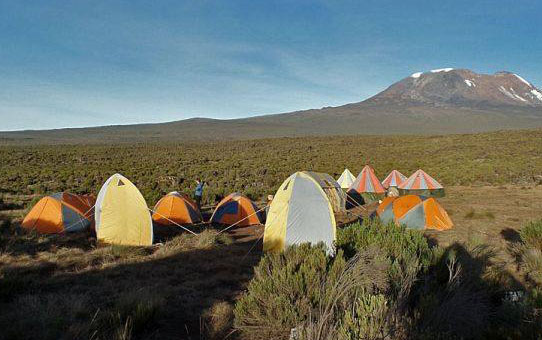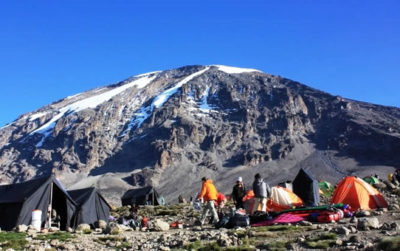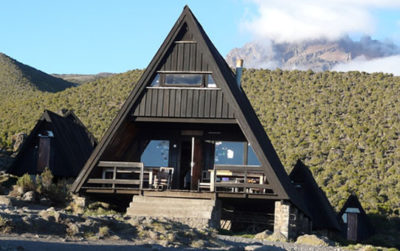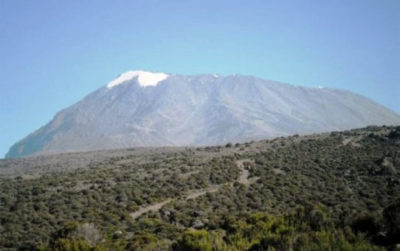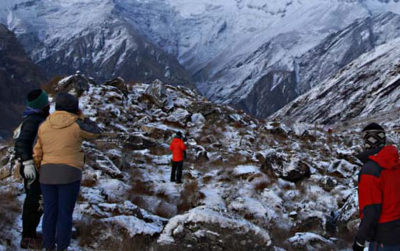- :Less crowded route.
- :gives you a unique wilderness experience of sporting some animals like the elephants,bufalloes, and antelopes,
- :less likely to encounter rain,less moisture
- :one of the easiest route
The Rongai route is the only route that approaches Kilimanjaro from the north, close to the Kenya border. Though gaining popularity amongst climbers who want to attempt the uhuru peak this route still experiences low crowds. Rongai has a more gradual slope than the mountain’s other routes. It is the preferred route for those looking for an alternative to the popular Marangu route, for those who would like a more remote hike, and for those who are climbing during the rainy season (the north side receives less precipitation). Rongai is a moderately difficult route, and is highly recommended, especially for those with less backpacking experience.
Although the scenery is not as varied as the western routes, Rongai makes up for this by passing through true wilderness areas for nearly the entire way. Descent is made via the Marangu route
7 days Rongai kilimanjaro climb
Day 1:-Rongai Gate (1,800m/5,900ft) to First Cave Camp (2,600m/8,400ft)
Elevation Gain: 760 meters, 2,000 feet ;After an early breakfast in Moshi, drive to the Rongai Gate near the Kenya border. After registering at the gate, begin your climb to Uhuru Peak, the roof of Africa. During the first day, hike through forests where you may see and hear wildlife. Eat lunch on the trail before continuing to the first campsite. Rongai ascends via the less forested northern side of the mountain.
NB;Rongai Route is one of the least crowded routes on Kilimanjaro because of the long drive to the gate. The Rongai trail is thought to have the best chance of viewing wildlife.
Day 2:-First Cave Camp (2,600m/8,400ft) to Kikelewa Camp (3,600m/11,810ft)
Elevation Gain: 1,000 meters, 3,280 feet;During day two hike through Kilimanjaro’s moorland. The Rongai route is relatively short and steep, making for shorter hiking times. During this day, view Mawenzi Peak ahead.
Day 3:- Kikelewa Camp (3,600m/11,810ft) to Mawenzi Tarn Camp (4,330m/14,200ft) Elevation Gain: 730 meters, 2,390 feet;
This day is an acclimatization day, allowing you to hike in the beginning of the day and rest in the afternoon and evening. The hike is relatively short but steep. The Mawenzi Tarn campsite is situated below Mawenzi Peak and offers stunning views of both Mawenzi and Kibo
Day 4:-Mawenzi Tarn Camp
Day four is an acclimatization day at Mawenzi Tarn. We advise hiking a bit higher this day before returning to Mawenzi Tarn in the afternoon.
Day 5:-Mawenzi Tarn Camp (4,330m/14,200ft) to Kibo Camp (4,750m/15,580ft)
Elevation Gain: 420 meters/1380 feet;Cross the lunar landscape of the saddle on this day to arrive at the final campsite. Kibo Camp is situated directly below the Kibo cone, giving you views of your final destination.
Day 6:-Kibo Camp (4,750m/15,580ft) to Uhuru Peak (5,895m/19,340ft) to Horombo Hut (3,720m/12,200ft)
Elevation Gain: 1,145 meters, 3,760 feet
Elevation Loss: 2,175 meters, 7,140 feet
Around midnight, begin the final ascent to Uhuru Peak, the highest point in Africa. For the next six hours, hike by the light of your flashlight. The ascent to the crater rim is the most challenging part of the entire trek. The trail is very steep until you reach the crater rim at Gilman’s Point.
The hike from Gilman’s to Uhuru Peak is a gradual climb and, as far as hikes go, not very difficult. The altitude, however, makes the hike long and tiring. The crater rim hike takes approximately two hours. Upon reaching Uhuru, take photos of your guide and group at the peak before beginning the descent to Horombo Hut.
Day 7:Horombo Hut (3,720m/12,200ft) to Marangu Gate (1,800m/5,905ft)
Elevation Loss: 1,920 meters, 6,295 feet
After breakfast, finish the trek with a descent to Marangu Gate. Your last hike on Kilimanjaro is a beautiful one, passing through Kilimanjaro’s cloud forest. Watch your step during the descent, as the trail can be slippery. Ascend Tanzania vehicles will be waiting at Marangu Gate to take you back to Moshi drop off at hotel.
3 Pax US D$1,700 per person
6 Pax US D $1600 per person
Above 6 Pax $ 1,550 per person
This includes:
- All park entry fees
- Camping fees
- Rescue fees
- Sufficient food 3 meal a day.
- Company professional mountain guide
- Reasonable number of porters+cook
- Transfer of clients to the gate including pick up on the last day back to Arusha.
- 2 nights Accomodation
- good tents
Not included:
- Water and soft drinks
- Personal spending money for things like beers,ciggeretes
- Tips for porters and guides
- Hiking gears but we have for hire.
- Visas
Enquiries and Bookings
Please fill in the form below to book or make further enquiries

